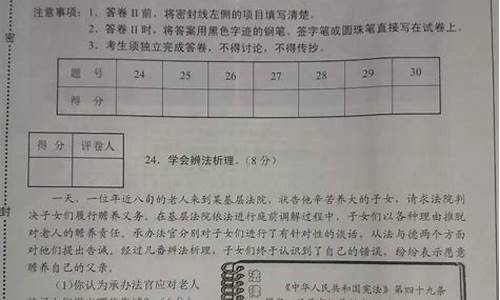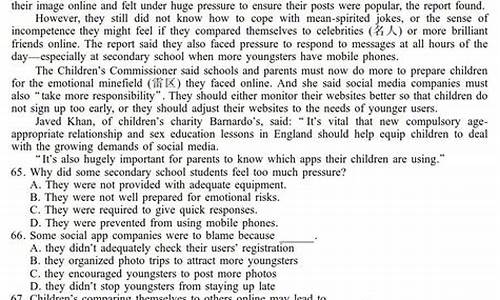您现在的位置是: 首页 > 招生信息 招生信息
2017年河北高考卷,2017河北高考文综
tamoadmin 2024-07-19 人已围观
简介1.使用全国新课标卷的省份都有哪些2.2017年河北高考文科人数3.2017年河北省高考分数线4.2017高考状元榜有?5.求河北省历年高考状元名单。6.河北英语高考题2017年不一样,试卷选用情况如下:全国I卷(全国乙卷):河南、河北、山西、安徽、湖北、湖南、江西、广东、福建、山东(注:2017年山东省仅英语、综合两科使用全国卷,语文、数学两科仍自主命题)全国II卷(全国甲卷):黑龙江、吉林、辽
1.使用全国新课标卷的省份都有哪些
2.2017年河北高考文科人数
3.2017年河北省高考分数线
4.2017高考状元榜有?
5.求河北省历年高考状元名单。
6.河北英语高考题2017年

不一样,试卷选用情况如下:
全国I卷(全国乙卷):河南、河北、山西、安徽、湖北、湖南、江西、广东、福建、山东(注:2017年山东省仅英语、综合两科使用全国卷,语文、数学两科仍自主命题)
全国II卷(全国甲卷):黑龙江、吉林、辽宁、内蒙古、宁夏、甘肃、新疆、青海、西藏、陕西、重庆、海南(注:2017年海南省仅语文、数学、英语三科使用全国卷,物理/政治、化学/历史、生物/地理三科仍使用教育部为其单独命题的分科试卷)
全国III卷(全国丙卷):贵州、广西、云南、四川
自主命题:北京、天津、江苏、浙江、上海、山东(仅语文、数学两科)。
扩展资料不得参加高考的情形:
(1)具有高等学历教育资格的高校的在校生;或已被高等学校录取并保留入学资格的学生;
(2)高级中等教育学校非应届毕业的在校生;
(3)在高级中等教育阶段非应届毕业年份以弄虚作手段报名并违规参加普通高校招生考试(包括全国统考、省级统考和高校单独组织的招生考试)的应届毕业生;
(4)因违反国家教育考试规定,被给予暂停参加普通高校招生考试处理且在停考期内的人员;
(5)因触犯刑法已被有关部门取强制措施或正在者。
百度百科——2017年普通高等学校招生全国统一考试
使用全国新课标卷的省份都有哪些
河北省高考考试时间和全国统一高考时间相同,是6月7日、8日。
6月7日上午9:00-11:30第一科是语文,下午15:00-17:00第二科考数学;6月8日上午9:00-11:30第三科考综合(文综/理综)、6月8日下午15:00-17:00第四科考外语。
2018年秋,河北省全省进入高考改革阶段,秋季入学的学生将在三年的学习过程中,参与到事关前途命运的高考改革之中,并于2021年进行新高考,填报志愿参加录取。
改革考试科目设置。增强高考与高中学习的关联度,考生总成绩由统一高考的语文、数学、外语3个科目成绩和高中学业水平考试3个科目成绩组成。保持统一高考的语文、数学、外语科目不变、分值不变,不分文理科,外语科目提供两次考试机会。
计入总成绩的高中学业水平考试科目,由考生根据报考高校要求和自身特长,在思想政治、历史、地理、物理、化学、生物等科目中自主选择。
扩展资料:
河北省是我国的高考大省,2018年该省高考报名人数48.6万人,位居全国第六。6月末各省高考成绩揭晓后,河北省700分以上人数最多,占了全国一半。而全国一卷地区中,700分以上人数共有161人,河北就有122人。
河北省的重点录取率却很低。2017年该省211重点大学录取率为4.42%,全国倒数六;2016年211重点大学录取率仅为1.82%,与其他很多省份有着较为明显的差距。
根据河北省教育考试院公布的数据,2018年河北高考报名人数48.64万人,同比增长5.02万人,连续第三年回升。2017年河北高考本、专科实际录取考生40.12万人,实际录取人数首次突破40万大关,连续三年实现高考报名人数和实际录取人数双增长。
高考网-各省高考时间
百度百科-普通高等学校招生全国统一考试
2017年河北高考文科人数
2017年高考使用全国Ⅰ卷的省份:
福建、河南、河北、山西、江西、湖北、湖南、广东、安徽。
部分使用全国Ⅰ卷省份:
山东卷:全国Ⅰ卷(外语、文综、理综) 自主命题(语文、文数、理数)。
2017年高考使用全国Ⅱ卷的省份:
甘肃、青海、内蒙古、黑龙江、吉林、辽宁、宁夏、新疆、 *** 、陕西、重庆。
部分使用全国Ⅱ卷省份:
海南省:全国Ⅱ卷(语、数、英) 单独命题(政治、历史、地理、生物、化学、物理)。
2017年高考使用全国Ⅲ卷的省份:
云南、广西、贵州、四川。
2017年高考自主命题省份:
自主命题:江苏、北京、天津、上海、浙江。
2017年河北省高考分数线
21.81万人左右。2017年河北高考考生人数统计数据可知,2017年河北高考考生为43.63万人左右,文理考生比例为1:1,所以2017年河北高考文科考生人数为43.62除以2约等于21.81万人,所以文科人数为21.81万人。
2017高考状元榜有?
理科和文科的本科一批分别为485分和517分。
理科和文科的本科二批分别为326分和398分。
理科和文科的专科批都为200分。
高考:
普通高等学校招生全国统一考试(Nationwide Unified Examination for Admissions to General Universities and Colleges),简称“高考”,是合格的高中毕业生或具有同等学力的考生参加的选拔性考试。
普通高等学校招生全国统一考试,是为普通高等学校招生设置的全国性统一考试,每年6月7日-10日实施。参加考试的对象是全日制普通高中毕业生和具有同等学历的中华人民共和国公民,招生分理工农医(含体育)、文史(含外语和艺术)两大类。普通高等学校根据考生成绩,按照招生章程和,德智体美劳全面衡量,择优录取。
求河北省历年高考状元名单。
2017四川高考状元:四川省文科最高分来自成都实验外国语学校的涂涴童,总分为668分。
2017浙江高考状元:诸暨中学王雷捷语文132,数学147,英语144,物理100,化学100,生物100,总分723。
2017吉林高考状元:东北师大附中曹宇涵,取得了该校理科最高分,712分。吉大附中实验学校王婧雯同学以672的高分夺得吉林省2017届高考文科状元
2017贵州高考状元:文科状元:刘昱旻 都匀一中 裸分700分、总分720分;理科状元:李旭杨(语文132分,数学147分,外语143分,综合278分,总分700分)理科状元查致远:(语文133分,数学137分,外语145分,综合285分,总分700分
2017黑龙江高考状元:理科:白昊昕,712分,文科:李雨佳,648分。
2017湖北高考状元:随州一中的肖雨同学,以700分的高分成为湖北省理科状元;襄阳五中的范筱雨同学,以683分的高分成为湖北省文科状元 。
2017甘肃高考状元:文科状元:熊诗楠 师大附中654分(数学147分,英语141,文综242,语文124,);理科状元:肖智文 兰州一中691分(语文127,数学144,英语141,理综279)
2017安徽高考状元:文科最高分662分;理科状元来自合肥八中 黄杨光以706分勇夺安徽理科状元
2017北京高考状元:理科状元:北京八中素质班第一届毕业生李宇轩705分;文科状元:北京二中高三九班熊轩昂以总分690分
2017河北高考状元:理科状元:窦艺 高考成绩720分;文科状元:刘艺多,裸分680分。
2017内蒙古高考状元:2017年内蒙古高考理科裸分状元是来自呼市二中的翁楚彬:699分
文科状元是来自鄂尔多斯一中的王麟:630分
2017宁夏高考状元:银川一中武子健同学以676分获宁夏高考理科状元!;银川二中马晨睿实分663获宁夏文科状元,虚分683获文科第一名。
2017江西高考状元:丰城中学金淼以总分675分夺得2017年江西高考文科第一名
河北英语高考题2017年
2019年河北高考理科状元是衡水中学的王昊同学,语文138、数学150、外语148、理综281,总分717。大家都所痛恨的数学难度大,王昊同学竟考取了满分。至于文科状元,则有两个版本。
一是石家庄一中的郜楚煊同学,以689分的高分摘下桂冠;二是有人称郜楚煊的689分不是裸分,来自衡水中学的某位同学685分(纯文化分)才是真正的文科状元!
经了解,河北省今年有24万余名文理科考生,其中700分及以上27名,均为理科考生。文科考生高考分数在650分至678分档的人数为332人。
2018年,石家庄二中的孙浩宁以734分成河北省理科最高分;石家庄精英中学的郭家萌以707分成河北省文科最高分。据了解,理科考生孙浩宁的数学是满分,文科考生郭家萌来自民办名校。
2017年河北的高考状元理科状元:窦艺,沧州东光县人,高中就读于衡水一中,高考成绩720分。文科状元:牛璐瑶,来自石家庄二中的,高考的分数为681。
2016河北高考文科状元:袁嘉玮706分(裸分)河北高考理科状元:孟祥熙724分(裸分),衡水中学包揽2016年河北的文理科状元,省文理前十各占九名。
2014年河北高考文科状元:衡水中学郭宁676分 河北高考理科状元:衡水中学李榕榕裸分715分 。
许多在眼前看来天大的事,都不是人生一战,而只是人生一站。确实高考备战让你们很辛苦,可是已经坚持了这么久,这就已经是胜利。祝高考成功!下面是我为大家推荐的河北英语高考题2017年,仅供大家参考!
河北英语高考题2017年第I卷
注意事项:
1.答第I卷前,考生务必将自己的姓名、准考证号填写在答题卡上
2.选出每小题答案后,用2B铅笔把答题卡上对应题目的答案标号涂黑。如需改动,用橡皮擦干净后,再选涂其他答案标号。不能答在本试卷上,否则无效
第一部分听力(共两节,满分30分)
做题时,先将答案标在试卷上,录音内容结束后,你将有两分钟的时间将试卷上的答案转涂到答题卡上
第一节(共5小题;每小题1.5分,满分7.5分)
听下面5段对话。每段对话后有一个小题,从题中所给的A、B、C三个选项中选出最佳选项,并标在试卷的相应位置。听完每段对话后,你都有10秒钟的时间来回答有关小题和阅读下一小题题。每段对话仅读一遍。
例:How much is the shirt?
A.£19.15. B.£9.18. C.£9.15.
答案是C。
1. Where is Mary?
A. In the classroom. B. In the library. C. On the playground.
2. How much should the man pay for the tickets?
A. $16. B. $12. C. $6
3. Why can?t the woman give the man some help?
A. She is quite busy now.
B. She doesn?t like grammar.
C. She is poor in grammar,too.
4. What hened to Marx?
A. He lost his way.
B. He found his bike missing.
C. He lost his wallet.
5. Why did the man fail to attend the party?
A. He forgot it.
B. He didn?t know about the party.
C. He wasn?t invited to the party.
第二节(共15小题;每小题1.5分,满分22.5分)
听下面5段对话或独白。每段对话或独白后有几个小题,从题中所给的A、B、C三个选项中选出最佳选项,并标在试卷的相应位置。听每段对话或独白前,你将有时间阅读各个小题,每小题5秒钟;听完后,各小题将给出5秒钟的作答时间。每段对话或独白读两遍。
听第6段材料,回答第6、7题。
6. Why must the man drive to work?
A. It is the quickest way.
B. He has to use his car after work.
C. He lives too far from the subway.
7. What?s the relationship between the speakers?
A. Boss and employee.
B. Grandmother and grandson.
C. Teacher and student.
听第7段材料,回答第8~9题。
8. When is Alice?s birthday?
A. Tomorrow. B. The day after tomorrow. C. Today.
9. What will the two speakers buy for Alice?
A. A recorder. B. Some flowers. C. A box of chocolates.
听第8段材料,回答第10~12题。
10. What does the woman do in the group?
A. Play the piano. B. Play the violin. C. Sing for the group.
11. Who is Miss Pearson?
A. Leader of the group.B. Director of the group. C. Teacher of the group.
12. How often does the group meet?
A. Once a week. B. Twice a week. C. Every third week.
听第9段材料,回答第13~16题。
13. Who possibly is the woman?
A. An air hostess. B. A native Indian. C. A trel agent.
14. How long does the trip last?
A. Seven days. B. Eight days. C. Nine days.
15. What will the man probably do at the second stage?
A. Do some shopping. B. Visit the Taj Mabal. C. See wild animals.
16. What will the speakers do next?
A. Say goodbye to each other.B. Find out the price. C. Go to India by air.
听第10段材料,回答第17~20题。
17. In what way does Jack like to trel?
A. With a lot of people.
B. With one or two good friends.
C. All by himself.
18. What does Helen prefer on holiday?
A. Staying at home.
B. Seeing famous places.
C. Enjoying nature quietly.
19. What does Bob like the best about trel?
A. Making more friends. B. Buying what he wants. C. Seeing and learning.
20. Who prefers to do shopping while treling?
A. Jack. B. Helen. C. Bob.
第二部分阅读理解(共两节,满分40分)
第一节(共15小题;每小题2分,满分30分)
阅读下列短文,从每题所给的四个选项(A、B、C和D)中,选出最佳选项,并在答题卡上将该项涂黑。
A
We he designed all our bank cards to make your life easier.
Using your NatWest Service Card
As a Switch card, it lets you pay for all sorts of goods and services, whenever you see the Switch logo. The money comes straight out of your account, so you can spend as much as you like as long as you he enough money (or an agreed overdraft (透支) to cover it). It is also a cheque guarantee card for up to the amount shown on the card. And it gives you free access to your money from over 31,000 cash machines across the UK.
Using your NatWest Cash Card
You can use your Cash Card as a Solo card to pay for goods and services wherever you see the Solo logo. It can also give you access to your account and your cash from over 31,000 cash machines nationwide. You can spend or withdraw what you he in your account, or as much as your agreed overdraft limit.
Using your cards abroad
You can also use your Service Card and Cash Card when you?re abroad. You can withdraw cash at cash machines and pay for goods and services wherever you see the Cirrus or Maestro logo displayed.
We take a commission charge (手续费) of 2.25% of each cash withdrawal you make (up to£4) and a commission charge of 75 pence every time you use Maestro to pay for goods or services. We also ly a foreign-exchange transaction fee of 2.65%.
Using your NatWest Credit Card
With your credit card you can do the following:
* Pay for goods and services and enjoy up to 56 days? interest-free credit.
* Pay in over 24 million shops worldwide that display the MasterCard or Visa logos.
* Collect one AIR MILE for every£20 of spending that ears on your statement (结算单). (This does not include foreign currency or treler?s cheques bought, interest and other charges.)
21. If you carry the Service Card or the Cash Card, ________.
A. you can use it to guarantee things as you wish
B. you can draw your money from cash machines conveniently
C. you can spend as much money as you like without a limit
D. you he to pay some extra money when you pay for services in the UK
22. If you withdraw£200 from a cash machine abroad, you will be charged ________.
A. £4 B. £4.5 C. £5.25 D. £5.3
23. Which of the following is TRUE about using your NatWest Credit Card?
A. You he to pay back with interest within 56 days.
B. You can use the card in any shop across the world.
C. You will be charged some interest beyond two months.
D. You will gain one air mile if you spend £20 on treller?s cheques.
24. The purpose of the passage is to show you how to ________.
A. pay for goods with your cards B. use your cards abroad
C. draw cash with your cards D. play your cards right
B
Once when I was facing a decision that involved high risk, I went to a friend. He looked at me for a moment, and then wrote a sentence containing the best advice I?ve ever had: Be bold and bre ? and mighty (强大的) forces will come to your aid.
Those words made me see clearly that when I had fallen short in the past, it was seldom because I had tried and failed. It was usually because I had let fear of failure stop me from trying at all. On the other hand, whenever I had plunged into deep water, forced by courage or circumstance, I had always been able to swim until I got my feet on the ground again.
Boldness means a decision to bite off more than you can eat. And there is nothing mysterious about the mighty forces. They are potential powers we possess: energy, skill, sound judgment, creative ideas ? even physical strength greater than most of us realize.
Admittedly, those mighty forces are spiritual ones. But they are more important than physical ones. A college classmate of mine, Tim, was an excellent football player, even though he weighed much less than the erage player. ?In one game I suddenly found myself confronting a huge player, who had nothing but me between him and our goal line,? said Tim. ?I was so frightened that I closed my eyes and desperately threw myself at that guy like a bullet ? and stopped him cold.?
Boldness ? a willingness to extend yourself to the extreme?is not one that can be acquired overnight. But it can be taught to children and developed in adults. Confidence builds up. Surely, there will be setbacks (挫折) and disointments in life; boldness in itself is no guarantee of success. But the person who tries to do something and fails is a lot better off than the person who tries to do nothing and succeeds.
So, always try to live a little bit beyond your abilities?and you?ll find your abilities are greater than you ever dreamed.
25. Why was the author sometimes unable to reach his goal in the past?
A. He faced huge risks. B. He lacked mighty forces.
C. Fear prevented him from trying. D. Failure blocked his way to success.
26. What is the implied meaning of the underlined part?
A. Swallow more than you can digest. B. Act slightly above your abilities.
C. Develop more mysterious powers. D. Learn to make creative decisions.
27. What can be learned from Paragraph 5?
A. Confidence grows more rapidly in adults. B. Trying without success is meaningless.
C. Repeated failure creates a better life. D. Boldness can be gained little by little.
C
The wallet is heading for extinction. As a day-to-day essential, it will die off with the generation who read print newspapers. The kind of shopping-where you hand over notes and count out change in return?now hens only in the most minor of our retail encounters,like buying a bar of chocolate or a pint of milk from a corner shop. At the shops where you spend any real money, that money is increasingly abstracted. And this is more and more true, the higher up the scale you go. At the most cutting-edge retail stores?Victoria Beckham on Dover Street, for instance?you don't go and stand at any kind of cash register when you decide to pay. The staff are equipped with iPads to take your payment while you relax on a sofa.
Which is nothing more or less than excellent service, if you he the money. But across society, the abstraction(抽象) of the idea of cash makes me uneasy. Maybe I'm just old-fashioned. But earning money isn't quick or easy for most of us. Isn't it a bit incredible that spending it should hen in half a blink(眨眼)of an eye? Doesn't a wallet?that time-honoured Friday-night feeling of pleasing, promising fatness?represent something that matters?
But I'll lee the economics to the experts. What bothers me about the death of the wallet is the change it represents in our physical environment. Everything about the look and feel of a wallet?the way the fastenings and materials wear and tear and loosen with age, the plastic and paper and gold and silver, and handwritten phone numbers and printed cinema tickets?is the very opposite of what our world is becoming. The opposite of a wallet is a smartphone or an iPad. The rounded edges, cool glass, smooth and unknowable as pebble(鹅卵石). Instead of digging through pieces of paper and peering into corners, we move our fingers left and right. No more counting out coins. Show your wallet, if you still he one. It may not be here much longer.
28. What is hening to the wallet?
A. It is disearing. B. It is being fattened.
C. It is becoming costly. D. It is changing in style.
29. What makes the author feel uncomfortable nowadays?
A. Sing money is becoming a thing of the past.
B. The pleasing Friday-night feeling is fading.
C. Earning money is getting more difficult.
D. Spending money is so fast and easy.
30. Why does the author choose to write about what's hening to the wallet?
A. It represents a change in the modern world.
B. It has something to do with everybody's life.
C. It marks the end of a time-honoured tradition.
D. It is the concern of contemporary economists.
31. What can we infer from the passage about the author?
A. He is resistant to social changes.
B. He is against technological progress.
C. He feels reluctant to part with the traditional wallet.
D. He feels insecure in the ever-changing modern world.









